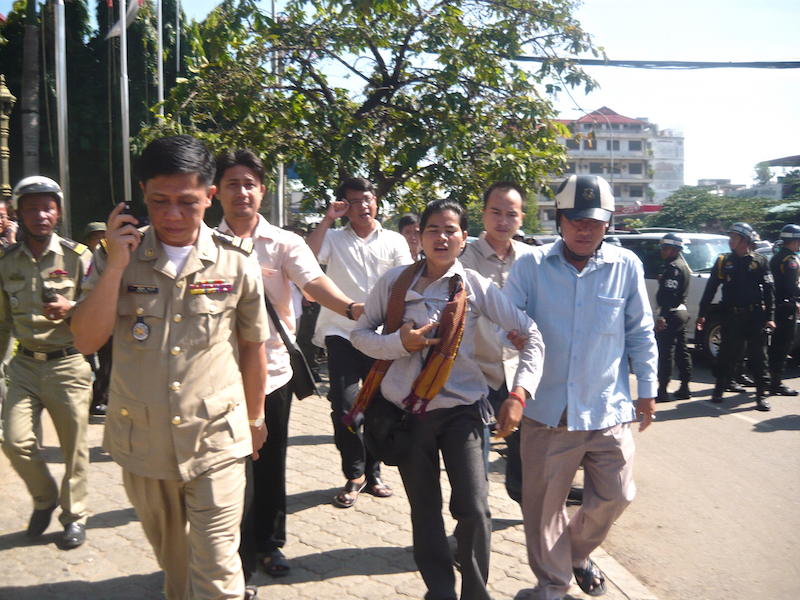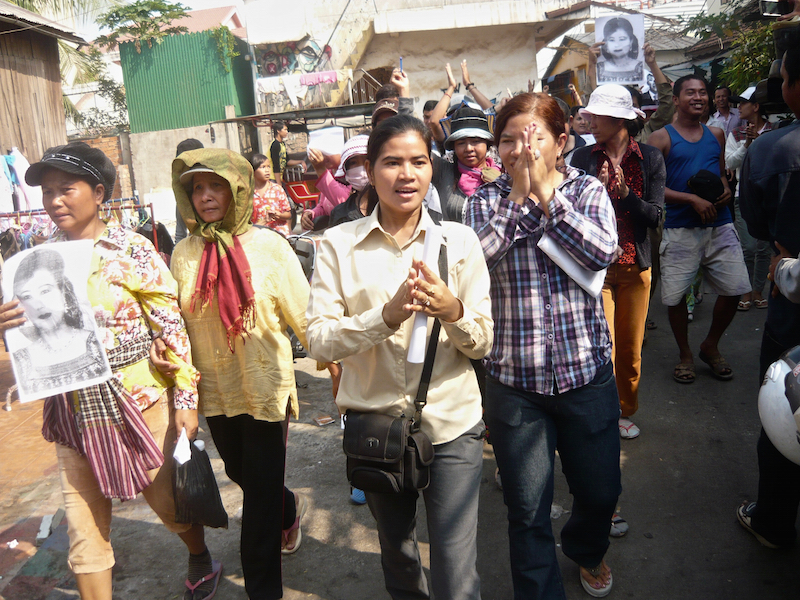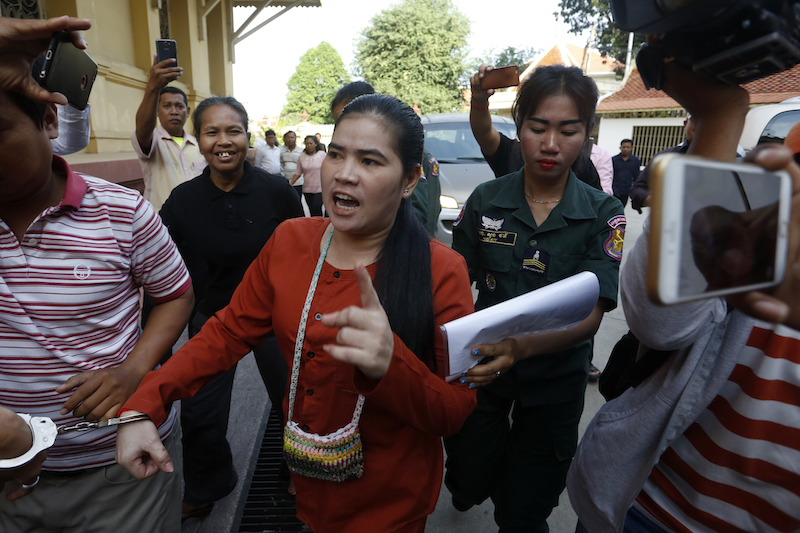Amid one of the biggest mass evictions since the Khmer Rouge—3,000 families violently expelled from Phnom Penh’s Boeng Kak neighborhood in 2008—protracted protests turned shop owners and housewives into full-time activists.
Tep Vanny, then a stay-at-home mother, resisted. She met baton-wielding officers in riot gear head-on and led chants at the community’s demonstrations.

Eight years later, as one of the country’s most prominent activists, Ms. Vanny is languishing in prison over old, resurrected charges that many believe the courts have pursued at the ruling party’s bidding.
Today, she is expecting an Appeal Court decision on her imprisonment.
Her family, supporters and local and international rights groups say they have little faith in the court delivering a fair verdict. But they continue to protest her imprisonment, drawing attention to a figure increasingly at the center of grassroots government opposition.
“It’s because of her activism and her work to protect the vulnerable people…that’s why a lot of people recognize her activism,” said Eang Vuthy, executive director of housing rights group Equitable Cambodia.
Ms. Vanny, 36, moved to Phnom Penh in 1998 from Kandal province, where she grew up in a poor family and came to hate what she described in previous interviews as oppression and discrimination. She and her now former husband, Ou Kong Chea, made a home in the Boeng Kak neighborhood, where Ms. Vanny was a housewife before her rise in activism.
In 2007, the Phnom Penh municipality granted a 99-year lease for Boeng Kak to Shukaku, a private company owned by CPP Senator Lao Meng Khin. Nearly two years later, more than 3,000 families were forcefully evicted from their homes.
Like millions of others across the country, the families lacked legal titles, though a 2002 land law should have entitled them to legal ownership because they had been there prior to the end of a government grace period, according to Mr. Vuthy. Those close to her say Ms. Vanny was adamant about fighting the injustice she believed her community faced. She was articulate. She could explain eloquently in both Khmer and English why she thought her community rightfully owned the land from which they were being expelled.
At protests, Ms. Vanny repeatedly chanted into a loudspeaker, her community echoing her words. She spoke to the media, and confronted officials in the fray of violent clashes. She was beaten and frequently arrested, as were many of her fellow Boeng Kak community members.
Boeng Kak lake was eventually paved over, but Ms. Vanny, fully committed to her search for justice, did not stop. She began to say that if she did not sacrifice her own life to find justice, she would be sacrificing the lives of her children by default. Her face became a familiar one at demonstrations across the country.

“She helped everyone: villagers who faced land issues, at Kem Ley’s funeral, in human rights issues. She never cared who it was,” said her 68-year-old mother Sy Hieb, referring to murdered political analyst Kem Ley. “She’s the strongest woman in the country.”
Ms. Vanny traveled continents to push for human rights. In April 2013, she received a global award for activism in a ceremony overseen by then-U.S. Secretary of State Hillary Clinton.
“Her vision and innovative spirit set her apart as a global role model, and we believe the significance of her work will be felt for generations to come,” Katherine O’Hearn, chief development and communications officer for Vital Voices, the global NGO that hands out the award, said in an email last week.
Her activism appeared to take a toll on her personal life. It eventually drove a wedge between her and her husband, leading to their divorce. But she continued her crusade.
A year ago, Ms. Vanny was put behind bars for leading a demonstration seeking the release of five human rights defenders dubbed the Adhoc 5. Years-old charges were then piled against her, and today she is expected to hear the Appeal Court’s decision over a 30-month sentence for participating in a protest that turned violent in front of Prime Minister Hun Sen’s mansion in March 2013.
Daun Penh district security guards claim Ms. Vanny attacked them during the demonstration, but she says they were the violent ones.
Since being imprisoned, she has suffered chronic stomach pains and diarrhea, according to community members. Her two children, a son and a daughter, have only been able to embrace her as she has been escorted between court hearings and prison vans. If the judiciary leans in her favor today, Ms. Vanny could be immediately freed. But no one sees this as a likely outcome.

“I don’t expect the court will release her,” Boeng Kak activist Bo Chhorvy said. “Our court system is a remote control that follows as it is ordered…. If Samdech Hun Sen doesn’t order it, there is nobody at court to release her.”
Phil Robertson, deputy Asia director for Human Rights Watch, said Ms. Vanny serves as a warning to others.
“Tep Vanny’s imprisonment on bogus charges is all about sending a message to land protesters and other grassroots communities with grievances that they should not protest or cause difficulties for the government at this time,” he said in an email.
A report released last month by rights group Licadho argues that a series of arrests and charges since early 2015, including Ms. Vanny’s, contribute to a government effort to silence dissent. Ms. Vanny is also listed by Licadho as one of the country’s 20 political prisoners.
But if her arrest was a government attempt to quiet grassroots activism, her supporters have not kept silent. At Ms. Vanny’s Appeal Court hearing last month, a group of 30 Boeng Kak community members gathered outside of the court, passionately calling for her release throughout the two-hour court appearance.
Ahead of her hearing, a group of 27 civil society organizations urged Ms. Vanny’s release in a statement, saying the case against her was “based on her peaceful activism at a 2013 protest, for which she received a draconian sentence.”
Her name has also repeatedly appeared in statements by international governments seeking the ruling party’s adherence to to international human rights standards as political tension rose ahead of the June 4 commune elections.
Her mother, Ms. Hieb, said her daughter’s continued imprisonment is baffling.
“I still wonder why my daughter has not been freed yet,” she said last month, tears billowing from her eyes. “She always works with other activists, but I don’t understand why she’s always in prison by herself.”
Justice Ministry spokesman Chin Malin said there was no bias or malintent against Ms. Vanny.
“Every case is different because the facts are different, [and] this case involves many different people and factors,” he said. “It depends on the court’s consideration of legal factors. Outsiders can only use feelings to draw conclusions.”
While Cambodia “has no political prisoners…sometimes politicians link some prisoners to politics for their benefit,” he said.
City Hall spokesman Met Measpheakdey said Ms. Vanny had finally received due punishment as the demonstrations she led often resulted in public disorder, including a 2014 protest in which Boeng Kak activists blocked the street in front of City Hall with a bed frame.
“In fact, she had been committing illegal activities,” he said. “She never cared about the impact on other people.”
Despite her imprisonment, Ms. Vanny’s voice has still been heard loudly by the local and international community, fellow activists and human rights defenders say.
“If the government does not want to lose its reputation, it should set Tep Vanny free because this will affect the elections in 2018,” fellow Boeng Kak activist Song Sreyleap said.
“In Cambodia, a lot of people know Tep Vanny very well, even the rural people. So that’s why it does not prove beneficial to the government if she’s going to be detained,” added Mr. Vuthy of Equitable Cambodia added.
If the Appeal Court upholds the sentence, “I’m very sure the human rights groups will continue to organize or protest about this detention” both locally and internationally—mirroring Ms. Vanny’s own persistence.
“We will never give up hope,” Ms. Vanny said in a 2013 interview with The Cambodia Daily. “We know that we will be beaten, arrested, charged and even killed, but we will find a way to fight for our rights and we hope we will receive justice one day.”
Despite 358 days behind bars, fellow activists say that Ms. Vanny’s determination to fight injustice has not wavered. Rights workers are asking whether Ms. Vanny will receive the justice she has long sought today.
(Additional reporting by Van Roeun)



